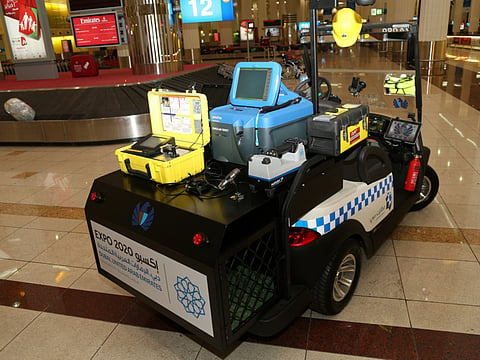Smart device to catch drug smugglers in Dubai
Dubai Customs uses Al Kashif that has 16 gadgets to detect narcotics, explosives and other materials

Dubai: A modified golf cart is now being used by Dubai Customs to foil drug smuggling attempts.
The cart, named ‘Al Kashif’, is equipped with 16 devices, making it capable of detecting various narcotics, inflammable and radioactive materials, and explosives. The eco-friendly golf buggy can also analyse medication samples in seven minutes.
Al Kashif, which is the first of its kind around the world, contains a security camera, monitor, wireless devices, fire extinguisher, iPad, a document verification device, Ion scan, helmet, and a cage for a Customs dog. It may be used as a mobile power generator for seven hours. It may also be used for external inspection by simply adding a solar panel, making it 100 per cent eco-friendly. Similar devices are planned to be used in all the airports and border customs centres of the emirate.
The cart, which is already being put to use at Dubai Terminal 3, was developed by Dubai Customs Senior Inspector Mohammad Al Khanjari.
“Through my extensive experience dealing with numerous cases at the airport, and knowing the ins and outs of customs work, I came up with an idea that developed into Al Kashif vehicle. Inspired by the vision of His Highness Shaikh Mohammad Bin Rashid Al Maktoum, Vice-President and Prime Minister of the UAE and Ruler of Dubai, who always calls for development of government services, I wanted to expedite customs procedures in order to ease customs formalities for passengers. I wanted something to reach passengers where they are.
“Not only does Al Kashif detect narcotics, explosives and radioactive items,” Al Khanjari said, “but it also analyses any medicine in just seven minutes instead of seven days as was the case before. It also verifies the authenticity of travel documents.”
He said, “I wanted a multi-purpose inspections device to reach passengers where they are.”
Al Khanjari said that earlier, if passengers were held with suspicious medications, they would be referred to the Health Ministry for analysis, a process that took four to seven days. “With Al Kashif available, the cart can do everything in just seven minutes. That definitely benefits passengers, cuts their waiting time, and allows them to take home their medications — particularly those with chronic diseases such as diabetes and high blood pressure.”
Recently, Dubai Customs foiled a heroin smuggling operation at Dubai Airport’s Terminal 3 using Al Kashif. Authorities arrested the Asian man, who had hid 9.2kg of heroin in the lining of his suitcase.
Al Khanjari said Dubai Customs first has to deem a traveller as suspicious before deploying Al Kashif to analyse belongings.
“We have a state-of-the-art CCTV at the airport, which can zoom in to the point we are able to see a text message a suspicious person is writing or a name in the passport he is holding,” he said, “The control room often directs an undercover team to follow or watch a suspicious passenger to investigate further. When we find something fishy in a person’s luggage, we deploy Al Kashif.”
Al Khanjari said the Customs team still relies on old-fashioned instincts in their mission to secure the country’s borders.
“We go through intensive training in discerning a person’s intentions through body language,” he said, “it plays a crucial part in the job. Passengers’ facial expressions, eyes, body movement and the way they dress can all alert officers to any suspicious activities. There is no alternative to good old-fashioned instinct.”
Al Khanjari noted that people with illegal items are never in a rush to leave the airport, he said they always take more time than needed to get out in order to throw off officials.
He said: “We sit and observe passengers, and if we get suspicious we might put someone under surveillance for hours. We have a disguise room and we keep changing our clothes during the shift so we are not discovered. I once followed a passenger in Terminal 3 for nine hours until I made sure what he was up to. He was attempting to smuggle watches into the country.”
Al Khanjari said a common tactic used by smugglers, or those with fake documents, is to pretend to be preoccupied with children. He said that they pretend to be busy with children as soon as they come to the inspection area.
“In some instances,” he said, “passengers who are caught smuggling miss their flights purposely, and hang around the airport for several hours before trying to get out of the country.”



